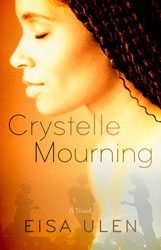Jill Dearman Interviews Eisa Ulen
From Barnes and Noble Book Clubs, April 2010
Eisa Nefertari Ulen is a New York author who shifts seamlessly between fiction and nonfiction; and her work shifts seamlessly from heavy emotions to lighter ones. Below, my interview with Eisa: Jill Dearman: Tell us about your evolution as a writer, and what your writing practice is like.
Eisa Nefertari Ulen: Well, I think I’ve always been a writer. I just didn’t know I could call myself that. I wrote my first story, about tulips and teepees, when I was about 5 or so. I kept a journal all through my girlhood and contributed to my high school literary journal and local teen newspaper. I never thought about a writing career, though. It wasn’t something I gave myself permission to do. Then, one day in Mr. Ray’s English class I asked my friend what college she hoped to get into. When she said Oberlin, I asked why, and she said the thing that changed everything for me. She said: ‘Because I want to be a writer.’
That blew me away. I mean, there I was, a girl surrounded by books, a fanatic reader dressed in all black and completely strung out on the feel of pencil moving across a lined notebook page, but I had never thought about turning those passions into the work that I do to live. I guess I had never thought of myself as free enough to take that leap, away from family expectations and the pressures to succeed that plague us all in this capitalist society. I attended Sarah Lawrence College (http://www.slc.edu/) mostly because they have such a tremendous writing program, and in my senior year Urban Profile published a short story I wrote, a cautionary tale for city girls set in the 1980s called ‘Little Red Cap.’ For the very first time I had written something that ran in a national publication.
I started writing every morning back then, a practice I more or less maintained through the years, but writing in the morning has become much harder to do since I had a baby. Much harder to do — I’m working out a new rhythm now and doing it with such joy because I love my baby boy so much.
 JD: Crystelle Mourning explores issues of grief; where in yourself did you find those emotions?
JD: Crystelle Mourning explores issues of grief; where in yourself did you find those emotions?
ENU: I never experienced what Crystelle goes through, but I was there. What I mean is, the novel explores the experience of loss that so many girls and young women endured in the 1980s — the so-called Crack Era. I was a witness to it all: death over drugs, death over corners, death over sneakers or words or the slightest shove at a too-crowded house party. Death over someone else’s death. Baltimore had the highest assault rate in the country when I was growing up there, and D.C. was called The Murder Capital. I saw what was happening. I was there to bear witness to it. And I wrote it down. I remembered.
JD: In addition to being a novelist, you are also a journalist and teacher, who is often asked to discuss the nuances of language. Could you tell us about your linguistic obsessions?
ENU: I just love all the quirks of oral culture, the ways folk speak. I love to listen. New York is so great. Just by jumping on the subway and listening in on other people’s conversations you hear how different the Spanish spoken in Washington Heights is from the Spanish spoken in DR from the Spanish spoken in Barcelona, because the New Yorkers and Dominicans and Spaniards are all crowded on the train together. James Baldwin wrote an essay about different Englishes, about different ways of speaking French, but in New York, you can hear all the Englishes, all the ways folks from around the world speak French. The city spits back all the funky fresh ways people talk. Nice.
JD: Who are the authors who have influenced you the most, and who are you reading now?
ENU: I’m a Harlem Renaissance girl. I love Zora Neale Hurston’s Their Eyes Were Watching God and Jean Toomer’s Cane. I don’t know how they influenced me — a reader would have to answer that, but they are my two favorite books.
I just finished reading Dark Days, Bright Nights by Peniel E. Joseph and love the way this historian has documented the Black Power Era’s engagement with participatory democracy. Joseph has situated President Obama on a continuum of Black male leadership’which is really American leadership, leadership for a better America’that includes Malcolm X and Stokely Carmichael. Next on my pile is James Hannaham’s God Says No, which I must read in time for our next RingShout salon.
JD: Yes, I spoke with James about his book, for this very column! So, what can you tell us about your next project?
ENU: Aw, shucks, sister love. That would be like giving you the keys to the Queendom.
JD: All right, I admit, I love a mystery!
Or check out the book, Bang the Keys